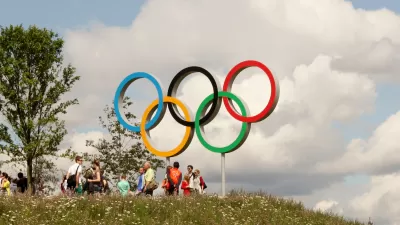The Olympics can be a huge boon for cities -- in terms of international attention, physical legacies and infrastructural development. But they can also be a huge risk. This piece from Finance and Development looks at the pros and cons.
"Hosting a large sporting event potentially offers both direct and indirect economic benefits. Direct benefits include capital and infrastructure construction related to the event, long-term benefits such as lower transportation costs thanks to an improved road or rail network, and spending by tourists who travel from out of town to attend the games. Indirect benefits may include advertising effects that showcase the host city or country as a potential tourist destination or business location in the future and an increase in civic pride, local sense of community, and the perceived stature of the host city or country. But there is also a potential downside, resulting from possible cost overruns, poor land use, inadequate planning, and underutilized facilities.
The Olympic Games are much like other large sporting events, such as the World Cup, Super Bowl, or World Series, but they involve many more participants, officials, and fans; require more infrastructure construction; generate many more out-of-town visitors; and generally have a much higher profile."
The development of games-related infrastructure can have long-term benefits for host cities, but also represents large upfront investments that prospective hosts might not be able to afford. However, past hosts have shown that indirect benefits from these sorts of events can be even greater than those directly related to the games.
FULL STORY: Is It Worth It?

Alabama: Trump Terminates Settlements for Black Communities Harmed By Raw Sewage
Trump deemed the landmark civil rights agreement “illegal DEI and environmental justice policy.”

Planetizen Federal Action Tracker
A weekly monitor of how Trump’s orders and actions are impacting planners and planning in America.

The 120 Year Old Tiny Home Villages That Sheltered San Francisco’s Earthquake Refugees
More than a century ago, San Francisco mobilized to house thousands of residents displaced by the 1906 earthquake. Could their strategy offer a model for the present?

In Both Crashes and Crime, Public Transportation is Far Safer than Driving
Contrary to popular assumptions, public transportation has far lower crash and crime rates than automobile travel. For safer communities, improve and encourage transit travel.

Report: Zoning Reforms Should Complement Nashville’s Ambitious Transit Plan
Without reform, restrictive zoning codes will limit the impact of the city’s planned transit expansion and could exclude some of the residents who depend on transit the most.

Judge Orders Release of Frozen IRA, IIJA Funding
The decision is a victory for environmental groups who charged that freezing funds for critical infrastructure and disaster response programs caused “real and irreparable harm” to communities.
Urban Design for Planners 1: Software Tools
This six-course series explores essential urban design concepts using open source software and equips planners with the tools they need to participate fully in the urban design process.
Planning for Universal Design
Learn the tools for implementing Universal Design in planning regulations.
Clanton & Associates, Inc.
Jessamine County Fiscal Court
Institute for Housing and Urban Development Studies (IHS)
City of Grandview
Harvard GSD Executive Education
Toledo-Lucas County Plan Commissions
Salt Lake City
NYU Wagner Graduate School of Public Service



























